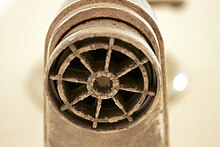
Back ماء عسر Arabic Cod su Azerbaijani খর পানি Bengali/Bangla Aigua dura Catalan Hartes Wasser German Σκληρότητα νερού Greek Malmola akvo Esperanto Agua dura Spanish Kare vesi Estonian آب سخت Persian

Hard water is water that has a high mineral content (in contrast with "soft water"). Hard water is formed when water percolates through deposits of limestone, chalk or gypsum,[1] which are largely made up of calcium and magnesium carbonates, bicarbonates and sulfates.
Drinking hard water may have moderate health benefits. It can pose critical problems in industrial settings, where water hardness is monitored to avoid costly breakdowns in boilers, cooling towers, and other equipment that handles water. In domestic settings, hard water is often indicated by a lack of foam formation when soap is agitated in water, and by the formation of limescale in kettles and water heaters.[2] Wherever water hardness is a concern, water softening is commonly used to reduce hard water's adverse effects.
- ^ "Hard water". National Groundwater Association. Retrieved 28 June 2019.
- ^ World Health Organization Hardness in Drinking-Water Archived 2021-11-05 at the Wayback Machine, 2003
© MMXXIII Rich X Search. We shall prevail. All rights reserved. Rich X Search